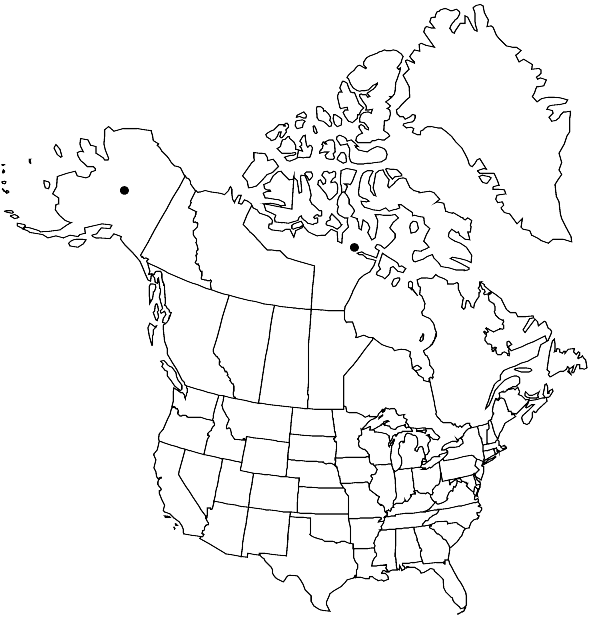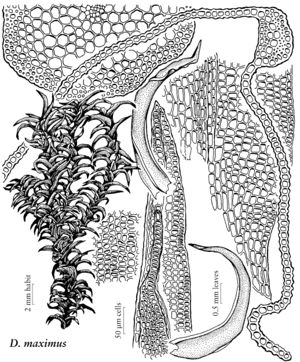Difference between revisions of "Didymodon maximus"
J. Bryol. 11: 599. 1982,.
FNA>Volume Importer |
imported>Volume Importer |
||
| (6 intermediate revisions by 2 users not shown) | |||
| Line 6: | Line 6: | ||
|place=11: 599. 1982, | |place=11: 599. 1982, | ||
}} | }} | ||
| − | |basionyms={{Treatment/ID/ | + | |basionyms={{Treatment/ID/Basionym |
|name=Barbula maxima | |name=Barbula maxima | ||
|authority=Syed & Crundwell | |authority=Syed & Crundwell | ||
| + | |rank=species | ||
| + | |publication_title=J. Bryol. | ||
| + | |publication_place=7: 527. 1974, | ||
}} | }} | ||
|synonyms= | |synonyms= | ||
| Line 24: | Line 27: | ||
|elevation=low to moderate elevations (20-1300 m) | |elevation=low to moderate elevations (20-1300 m) | ||
|distribution=Nunavut;Alaska;w Europe. | |distribution=Nunavut;Alaska;w Europe. | ||
| − | |discussion=<p>Didymodon maximus is rare and apparently disjunctive to the western British Isles (W. C. Steere and G. W. Scotter 1978).</p> | + | |discussion=<p><i>Didymodon maximus</i> is rare and apparently disjunctive to the western British Isles (W. C. Steere and G. W. Scotter 1978).</p> |
|tables= | |tables= | ||
|references= | |references= | ||
| Line 33: | Line 36: | ||
-->{{#Taxon: | -->{{#Taxon: | ||
name=Didymodon maximus | name=Didymodon maximus | ||
| − | |||
|authority=(Syed & Crundwell) M. O. Hill | |authority=(Syed & Crundwell) M. O. Hill | ||
|rank=species | |rank=species | ||
| Line 47: | Line 49: | ||
|publication year= | |publication year= | ||
|special status= | |special status= | ||
| − | |source xml=https:// | + | |source xml=https://bitbucket.org/aafc-mbb/fna-data-curation/src/2e0870ddd59836b60bcf96646a41e87ea5a5943a/coarse_grained_fna_xml/V27/V27_803.xml |
|subfamily=Pottiaceae subfam. Barbuloideae | |subfamily=Pottiaceae subfam. Barbuloideae | ||
|genus=Didymodon | |genus=Didymodon | ||
Latest revision as of 22:28, 5 November 2020
Plants green to red-brown. Stems often more than 3 cm, central strand present. Stem leaves appressed when dry, strongly recurved and keeled when moist, monomorphic, ovate-triangular, adaxially grooved along costa, 2–2.5 mm, base scarcely differentiated in shape to ovate, margins nearly plane to recurved at mid leaf, entire, apex broadly acute; costa percurrent to short-excurrent, not fragile, weakly tapering, widened pad of cells absent, adaxial costal cells elongate, 2–3 cells wide at mid leaf, guide cells in 1 layer; basal laminal cells differentiated medially, rectangular, walls thickened and often porose; distal laminal cells 13–15 µm wide, 1:1, papillae usually present, simple, often large, 1–3 centered over lumens, lumens angular, walls irregularly thickened and often trigonous but trigones smaller than lumens, convex on both sides, 1-stratose. Specialized asexual reproduction absent. Sexual condition sterile in range of flora. Sporophytes unknown. Distal laminal KOH reaction dark red.
Habitat: Cliffs, outcrops, canyons, limestone, tundra meadow
Elevation: low to moderate elevations (20-1300 m)
Distribution

Nunavut, Alaska, w Europe.
Discussion
Didymodon maximus is rare and apparently disjunctive to the western British Isles (W. C. Steere and G. W. Scotter 1978).
Selected References
None.
